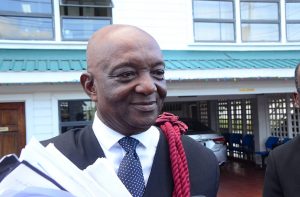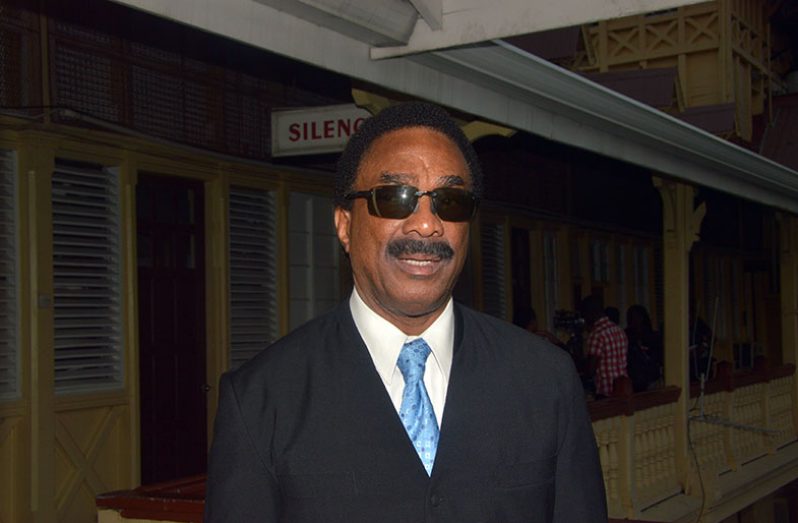…AG tells court over 110,000 registered, close to a billion spent
Attorney General Basil Williams has asked the High Court to allow the Guyana Elections Commission (GECOM) to complete the House-to-House Registration before General and Regional Elections are held.
“I am respectfully submitting that GECOM should be allowed to complete its national registration because it is only a matter of couple more weeks,” the Attorney General told the High Court on Monday, ahead of its August 14 decision.
In his oral submissions before Chief Justice Roxane George-Wiltshire, Williams said according to the affidavit submitted by the Elections Commission, more than 110,000 persons have registered since the national exercise commenced on July 20. The Commission, he posited, has already expended close to one billion dollar to execute the exercise.
The Attorney General noted that the results desired from House-to-House Registration, cannot be produced by simply doing Claims and Objections. In fact, he said, were GECOM to abandon the exercise and resort to Claims and Objections, it would be a herculean task to respond to every claim, and every objection within a period of two weeks. “If someone makes a claim or an objection, there has to be a hearing. So how are you going to adopt if we start with 20,000 or 50,000 objections, within two weeks,” the Attorney General reasoned.

As outlined in his written submission, the Attorney General took the court through the many changes the National Registration Act underwent to pave the way for the conduct of House-to-House Registration – a process he argued is mandatory every 10 years, by a decision of the Elections Commission. Under the National Registration Amendment Act, Chapter 19:08, GECOM was allowed to use the Official List of Electors (OLE) from the 2001 General and Regional Elections as the base to commence continuous registration.
Williams explained that an amendment to the legislation in 2005, also provided for the establishment of one or more offices in each registration district to facilitate, as far as practicable, the registration of every eligible person resident at the qualifying date in a registration district. The National Registration Amendment Bill of 2007 was subsequently introduced in December 2007. Williams urged the Court to analyse the explanatory memorandum of the bill. “The thrust of this Bill is to provide for the required House-to-House Registration for the purpose of all elections, local government elections and general elections,” the Explanatory Memorandum of the bill stated.
From that memorandum, Williams said, it is clear that there was a clear shift from only office- based registration to House-to-House Registration for all elections. In his written submission, he had alluded to the fact that the Parliament, by the National Registration Act. No. 31 of 2007, assented to by then President Bharat Jagdeo, introduced a section 4 (AA), which paved the way for Registration Officer to obtain as fast as practicable the application for registration of every eligible person, by way of House-to-House Registration.
The Attorney General, in support of his argument that House-to-House Registration is legal, further pointed the Court’s attention to the National Registration (Residents) Order of 2008. That order, which was issued by the Chairman of (GECOM), ordered persons to register under a process of House-to-House Registration between January 7, 2008 and July 4, 2008. He noted that the intention was to create a new Register of Registrants. He said additionally, the Elections Commission took a decision to conduct House-to-House Registration every 10 years in accordance with Article 162 of the Constitution.
The Attorney General said it was on that basis, that the Elections Commission in 2018 took a decision to conduct House-to-House Registration in 2019.
He noted that while the Opposition Leader Bharrat Jagdeo, in his submissions to the Caribbean Court of Justice (CCJ), had asked that the Official List of Electors be used, that list expired on April 30. As such he said there is no existing list, and the national registration process would allow for a new list to be extracted from the new Register of Registrants. “The period of six months has elapsed,” he noted, while reminding the court that GECOM has already expended close to a billion dollar in its quest to generate a fresh list in keeping with its policy. Williams submitted that the Commission’s current legal framework does not accommodate snap elections but the Chief Justice, in response, said GECOM has to operate within context. “The current context must be taken into consideration,” Justice George-Wiltshire said.
Senior Counsel, Neil Boston, the attorney representing the Chief Elections Officer (CEO) Keith Lowenfield, told the Court every person would be given a chance to register. He explained that if persons are unable to register during the ongoing exercise, when the preliminary list is produced, they would be given a second opportunity during the Claims and Objections period. Once placed on the National Register of Registrants, their names will be extracted and placed on the Official List of Electors, the Senior Counsel explained. He noted that the 2008 list was revised over the years through office based registration, but in keeping with its policy decision, GECOM commenced the process of House-to-House Registration.




.png)









